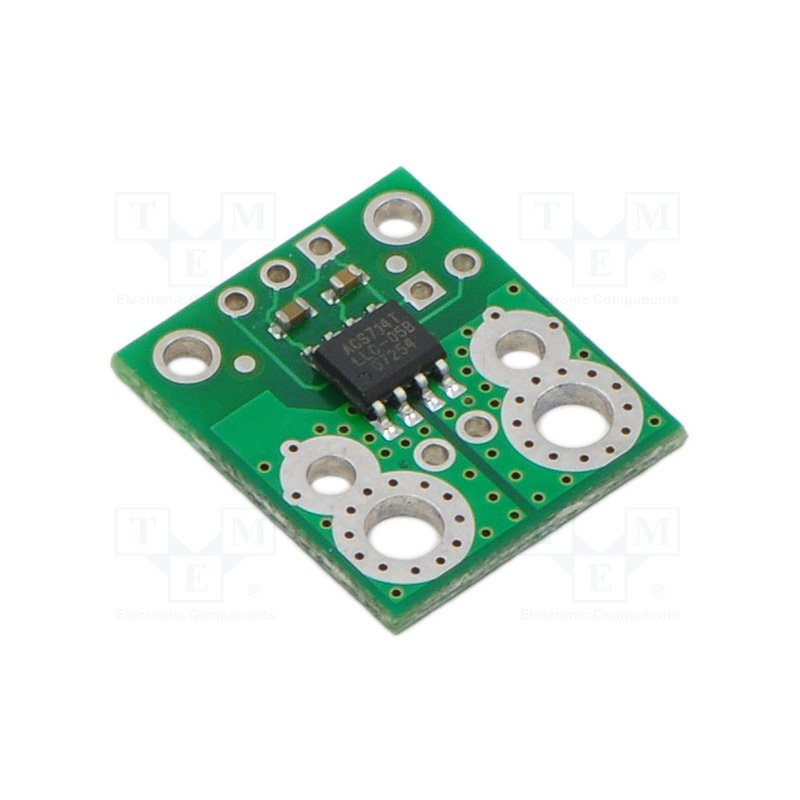



Sensor de corriente CC de efecto Hall -5-5A voltaje de carga 0-30V salida de voltaje ACS714 integrada 0-5V fuente de alimentación compatible con Arduino
 Pagos Seguros
Pagos Seguros
Paga con total seguridad mediante Tarjeta, PayPal, Amazon Pay o Transferencia Bancaria
 Envío Rápido
Envío Rápido
Enviamos a toda Europa y al resto del mundo con UPS, DHL y DPD
 Devolución Fácil en 30 Días
Devolución Fácil en 30 Días
Tienes 30 días desde la entrega para devolver el producto si no estás satisfecho
Sensore corrente DC ad effetto hall -5-5A tensione carico 0-30V integrato ACS714 uscita in tensione 0-5V Arduino compatibile alimentazione 4,5-5,5V DC.
This current sensor is a carrier board or breakout board for Allegro’s ACS714LLCTR-05B-T Hall effect-based linear current sensor; we therefore recommend careful reading of the ACS714 datasheet (678k pdf) before using this product. The sensor operates at 5 V and has an output sensitivity of 185 mV/A. The board ships fully populated with its SMD components, including the ACS714, as shown in the product picture.
The following list details some of the sensor’s key features:
Designed for bidirectional input current from -5 A to 5 A (though the robust sensor IC can survive up to five times the overcurrent condition).
Conductive path internal resistance is typically 1.2 mΩ, and the PCB is made with 2- oz copper, so very little power is lost in the board.
Use of a Hall effect sensor means the IC is able to electrically isolate the current path from the sensor’s electronics (up to 2.1 kV RMS), which allows the sensor to be inserted anywhere along the current path and to be used in applications that require electrical isolation.
80 kHz bandwith that can optionally be decreased by adding a capacitor across the board pins marked “filter”.
High accuracy and reliability: typical total output error of ±1.5% at room temperature with factory calibration, an extremely stable output offset voltage, and almost zero magnetic hysteresis.
Automotive-grade operating temperature range of -40°C to 150°C
The pads are labeled on the bottom silkscreen, as shown in the picture to the right. The silkscreen also shows the direction that is interpreted as positive current flow via the +i arrow. Like almost all our carrier boards, this sensor ships assembled with all of its required surface mount components, as shown in the main product picture. This version is marked with a blue X. We also sell a 30A unidirectional version and a ±30A bidirectional version of this board; you can distinguish these versions by reading the text on the IC or by looking at the color of the X on the bottom silkscreen.
Electrical connections
The sensor requires a supply voltage of 4.5 V to 5.5 V to be connected across the Vcc and GND pads, which are labeled on the bottom silkscreen. The sensor outputs an analog voltage that is linearly proportional to the input current. When Vcc is 5 V, this output voltage is centered at 2.5 V and changes by 185 mV per amp of input current, with positive current increasing the output voltage and negative current decreasing the output voltage.
The input current can be connected to the board in a variety of ways. For low-current applications, you can solder 0.1" male header pins to the board via the small through-holes on the input-current side of the board. For higher-current applications, you can solder wires directly to the throughholes whose sizes best match your wires, or you can use solderless ring terminal connectors, as shown in the picture to the right. The large through-holes are big enough for #6 screws. Mounting information The board has two mounting holes on the logic side of the board. These mounting holes are 0.5" apart and are designed for #2 screws. Filtering the output The IC has an internal filter resistance of 1.7 kΩ, and the carrier board includes a 1 nF filter capacitor, which produces a low-pass RC filter with a 90 kHz cutoff. You can improve sensing system accuracy for low-frequency sensing applictations by adding a capacitor in parallel with the integrated 1 nF capacitor across the pads marked “filter” on the bottom silkscreen (this capacitor is labeled C2b in the schematic below). The frequency F that the filter will attenuate to half its original power is given by: F = 1 / (2πRC) = 1 / (11kΩ * (1 nF + Cf)) where Cf is the value of the capacitor added to the filter pads.
|
Produttore |
POLOLU |
|
|
Tipo di sensore |
corrente |
|
|
Tensione di alimentazione |
4.5...5.5V DC |
|
|
Circuito integrato |
ACS714 |
|
|
Ambito di misurazione della corrente DC |
-5...5A |
|
|
Sensibilità del rilievo di corrente |
0.185V/A |
|
|
Dimensioni della piastrina |
17.8 x 20.3mm |
|
|
Informazioni |
Il prodotto non è un dispositivo completo, è solo un componente |
Informazioni aggiuntive
Peso lordo: 2.6 g